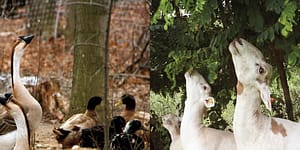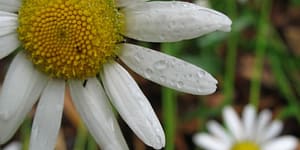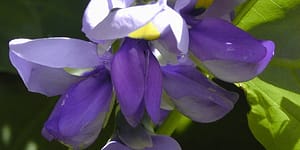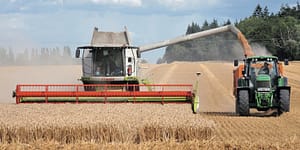Eager Beavers! And the winner is…
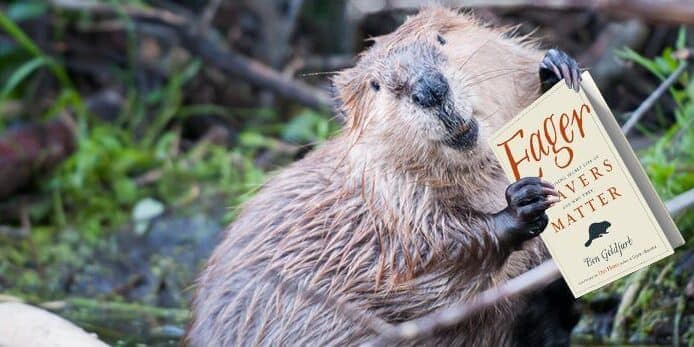
Eager: The Surprising, Secret Life of Beavers and Why They Matter has won the 2019 PEN America E.O. Wilson Prize for Literary Science Writing!
A first book by journalist Ben Goldfarb, Eager has received several accolades since its release last year, including being named an Outside Magazine’s “Best Book of 2018” and a “Notable Work of Nonfiction” citation from the Washington Post.
Goldfarb poses that beavers are a keystone species, having the “super power” of creating habitats for other species. Their protection is tied to the lives of countless other animals, from salmon to trumpeter swans. His book describes beavers as ecological and hydrological Swiss army knives, capable, in the right circumstances, of tackling many landscape-scale and environmental problems, from mitigating floods to improving water quality, to aiding in salmon runs and controlling wildfires.
From the PEN Judges’ Citation:
“Sometimes the best thing humans can do for the environment is hand it over to another species. While it is widely known that beavers dam waterways, often in ways that frustrate human plans, it is rarely acknowledged that these nocturnal rodents can radically transform vast swathes of land, boosting biodiversity, recharging aquifers, purifying water, reducing pollution, and protecting against erosion and wildfires.
Vast in scope but beautifully specific in detail, Eager: The Surprising, Secret Lives of Beavers and Why They Matter is an important environmental saga with clear implications for modern-day ecological policy. This true natural history portrays the inequities of settler impact on North America on a broad scale through a particular creature and ecosystem—revealing that we once lived in a much different world, and that we will struggle to reclaim that world without interspecies cooperation. While maintaining a strong central storyline, Goldfarb offers eye-opening, fascinating vignettes about these industrious engineering rodents and the people whose lives are devoted to reintroducing, protecting, and championing them.
At times tragic and at times hopeful, Eager is a charming, surprising, and compelling lesson in the intricacies of ecosystems, and the limits of human hubris.”
A full list of PEN Award winners can be found here.
Award-winning journalist Ben Goldfarb has traveled the world writing about wildlife conservation and the environment. He has chased endangered woodpeckers through war games on a North Carolina military base and withstood a bluff charge from a Yellowstone grizzly bear. He has tagged sea turtles, radio-tracked bats, and hand-lined sharks. In Eager, he turns his attention to nature’s most ingenious architects—the beaver—in which he tells the powerful story of how these ecosystem engineers have shaped our world, and how they can help save it—if we let them.
“Eager is a marvelously humor-laced page-turner about the science of semi-aquatic rodents. . . . A masterpiece of a treatise on the natural world.”
Recommended Reads
Badlands without Beavers: How Teddy Roosevelt became a conservationist
Recent Articles
Have you heard of silvopasture? This system of managing grazing animals is an ancient practice that integrates trees and pasture into a single system for raising livestock. These systems are managed for both forest products and forage, providing short-and long-term income sources in a mutually beneficial way for healthier animals, better soil, less pest control and mowing, and…
Read MoreOxeye daisies are one of the most important plants for pollinators including beetles, ants, and moths that use oxeye daisies as a source of pollen and nectar. Instead of thinking about removing a plant like oxeye daisy, consider how you can improve the fertility and diversity of habitat resources in your home landscape, garden, or…
Read MoreThis long-lived perennial legume is used for forage and erosion control. Kudzu is edible with many medicinal uses and other applications. Pollinators of all kinds love its prodigious lavender blooms!
Read MoreMove aside, maple! We have two new syrups to add to the table. Read on for insights on tapping, selling, and eating syrup from walnut & birch trees.
Read MoreWhy is modern wheat making us sick? That’s the question posed by author Eli Rogosa in Restoring Heritage Grains. Wheat is the most widely grown crop on our planet, yet industrial breeders have transformed this ancient staff of life into a commodity of yield and profit—witness the increase in gluten intolerance and ‘wheat belly’. Modern…
Read More





